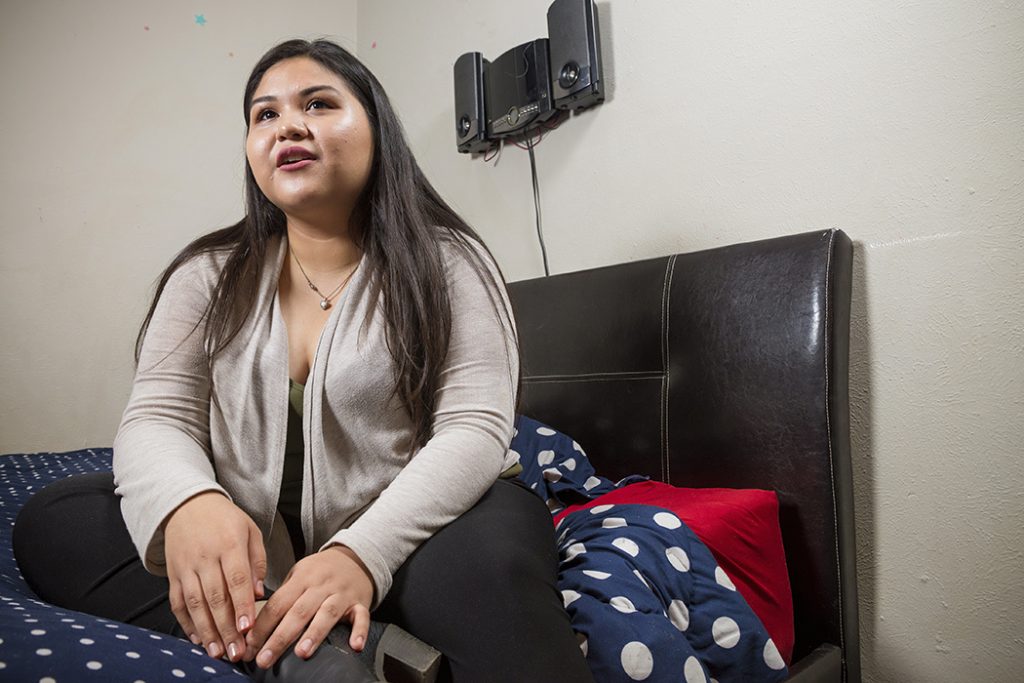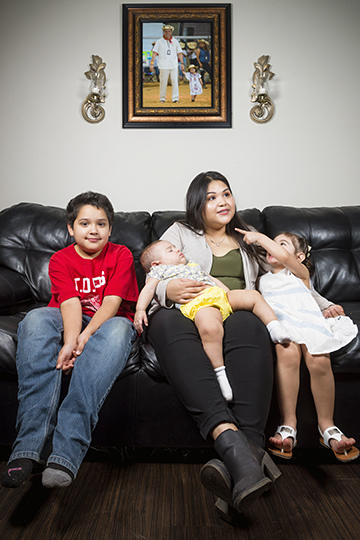Meet the fifth of five Lake Highlands High School students to appear in our May 2017 issue about graduating seniors who, despite facing incredible obstacles are (to quote Lin-Manuel Miranda‘s Hamilton), young, scrappy and hungry.
Monica was born in Nueva Rosita, Mexico to a 16 year old. A few years later her young mother decided to move to America, where Monica’s biological father lived. At 6, Monica moved with her mom into her father’s home in a small East Texas town.
“He turned out to be a terrible, cruel monster,” Monica says. “He was an alcoholic and abusive. I often describe living with him as living in a minefield, where you had to watch and be careful of what you said and did. I personally think he was sick. He would go on a rampage and leave my mother and I bruised all over and the next day apologize, as if it had all been an accident.”
Though there are provisions in place for undocumented women to report domestic violence without fear of deportation, the process was too complex, time-consuming and fearsome, Monica says.
“My mom had to work all the time in order to get away. She was so tired, and she never went through with [reporting the abuse].”
Instead they escaped to the Richardson area, learning along the way that life was “unforgiving for undocumented immigrants,” Monica says. They lived on very little and, to make matters worse, Monica’s father found them and continued to threaten their safety, Monica says, going as far as to gain partial custody of her. The constant fear, continued during the weekends she stayed with him.
“I’ll just say that now he is incarcerated,” Monica says. “And when he is done, he will be deported.”
A senior at Lake Highlands High School today, Monica is ready to graduate in the top 10 percent of her class with a 4.0 GPA — all her classes are AP or dual-credit college courses. She is a peer helper and a peer tutor, meaning she mentors other students both socially and academically. She works two jobs — one waiting tables and the other at a furniture store — putting in a collective 20-22 hours on weekends. Monica lives in an apartment on Whitehurst with her mom, who cleans offices for a living; stepdad, a chef; and three siblings for whom she cares when the adults are working — that is, every night and late.
The children’s ages are 10, 2 and 7 months. That leaves Monica with full hands and little time for studies until everyone is asleep or a parent comes home. “Yes, my youngest sibling is 18 years younger than me,” Monica quips. “I hopefully won’t be a mom for a very long time. Though I do get asked a lot if my siblings are my children. I must admit they do feel like my children.”
Her friend Blen Hussain says Monica was one of her first friends. “I don’t know how she does it, sometimes on two hours of sleep, walks to school, handles so much at home. I know she’s sad or tired sometimes, but rarely shows it, and she is intelligent without effort.”
Monica, like many students who came to the United States as children without documents, has endured times of darkness and doubt. She says enrolling in AVID has helped her stay strong when she feels vulnerable.
“Mr. [Matthew] Morris [AVID instructor] saw potential in me when I was in a very dark place,” she says. “He helped mold me into the student I am today. He has also leant an ear when I needed it, advice when I didn’t want it and, most importantly, unwavering support,” she says.
Monica secured relief from threat of deportation by applying for the Deferred Action for Childhood Arrivals (DACA) program, which the Obama administration put in place by executive action in 2012. It allows childhood arrivals to study and work in this country on two-year renewable terms. However the program does not allow students hoping to go to college to apply for certain student loans.
So far, Monica has gained acceptance to University of North Texas and University of San Antonio, and she has applied for close to a dozen scholarships.
The new administration could discontinue or phase out DACA at any time. During his presidential campaign, Donald Trump called DACA “illegal” and a violation of the constitution. It doesn’t feel good, Monica says, but she is not going to let dread, or anything else, stop her. She aims to study political science and attend law school.
“I might have to work harder. It might take longer.”
On Monica’s wall is a card from a memorial service for a sophomore friend. She killed herself, Monica explains, pointing to the girl’s photo. It was the worst day of high school, she says. “She was overwhelmed and took her own life. Since then I try to be kind to people whenever I can.”
Monica’s mom and stepdad are proud of their daughter, they both say. Her little brother is clearly enamored with her.
She looks down at the 10 year old and says, “I need to be strong, hard-working role model, for him.”







